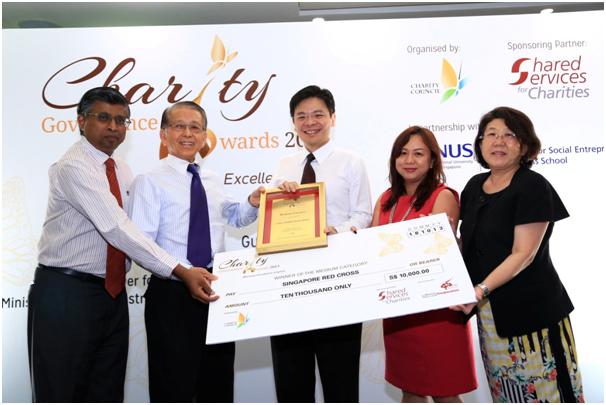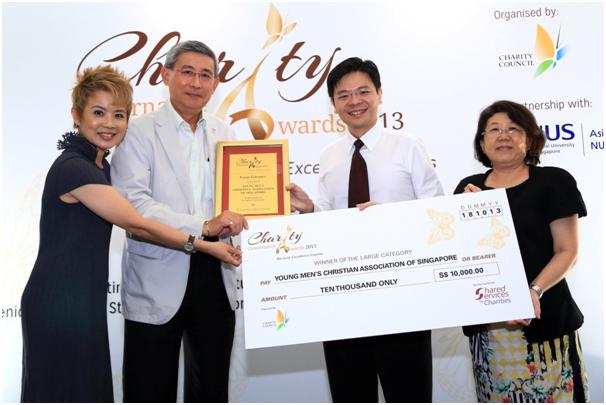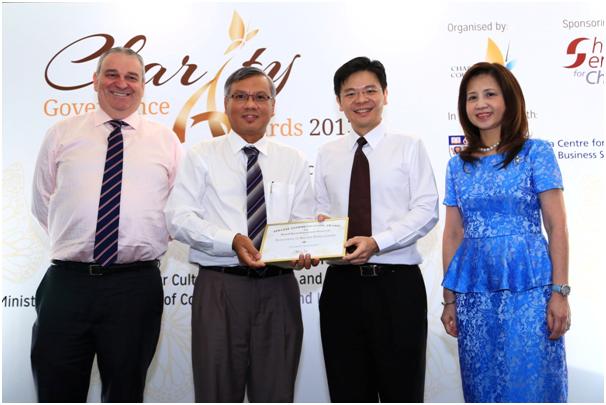The winners of the Charity Governance Awards (CGA) 2013 were revealed at the Awards Ceremony held on 18 Oct 2013 at the Novotel Clarke Quay. The Singapore Red Cross and the Young Men's Christian Association of Singapore (YMCA) were conferred
the top honours at this year's Awards.
pecial Commendation Awards were also given out to charities for excellence in particular areas of governance. This is the first year that the Charity Council gave out such awards. The Association of Muslim Professionals (AMP) emerged as the Special Commendation
Award winner for Board Recruitment and Renewal, while the Singapore Indian Development Association (SINDA) won the Special Commendation Award for Corporate Governance Policies and Strong Management.
The event, which brought together approximately 140 guests from 70 organisations, was graced by Acting Minister for Culture, Community and Youth, Mr Lawrence Wong.
An initiative of the Charity Council organised in partnership with the National University of Singapore's Asia Centre for Social Entrepreneurship and Philanthropy (ACSEP), the CGA honours charities that have adopted the highest standards of governance.
CGA 2013 Winners
CGA 2013Winners were each presented with a plaque and a cash prize of S$10,000 sponsored by the Shared Services for Charities and Keppel Corporation.
Winner of Medium Charities/IPCs Category: Singapore Red Cross

Overview and Fundamental Principles
As a premier humanitarian organisation, Singapore Red Cross (SRC) strives to instil the importance of exemplary governance in their staff. This helps to ensure stakeholders' confidence in SRC's ability to carry out duties and provide services
to the local and international community in an efficient and trustworthy manner. Rooted in its fundamentals, a framework of good governance is established and articulated by the Constitution of SRC. The Constitution reinforces the fundamental principles
of the Red Cross Red Crescent Movement and the provisions of the Geneva Conventions (1949), of which the Red Cross is a guardian.
Effective Leadership
At the heart of an organisation are the leaders who provide the direction and guidance for its day-to-day functioning. To ensure competent and reputable leadership, SRC's Council members are identified and recommended by the Corporate Governance and
Nominations Committee (CGN). The CGN relies on recommendations from the Centre for Non-profit Leadership. In recruiting Council members, SRC looks out for persons who bear credentials and dispositions that are valuable to SRC, and in-line with its
vision. All positions in the Council and the various standing Committees also carry term limits to ensure that there is regular rotation of personnel in the Council and oversight of committees.
In addition, SRC has implemented an annual self-evaluation process whereby Council members critically evaluate their own performance and that of their colleagues on the Council. This helps to ensure the commitment and effectiveness of the Council. The
Internal Audit process, carried out by an external vendor, also looks at, among other aspects, the various processes which involve the Council's participation.
Ethics and Conflict of Interest
SRC has established three formal policies, namely the 'Conflict of Interest Policy', 'Gift Acceptance Policy' and 'Whistle Blowing Policy', to address conflicts of interest and other ethical matters related to the work and operations
of the Society. Ethical conduct is promoted through the guidelines prescribed in employee handbooks and appropriate human resource management. Similarly, volunteer ethics and code of conduct are provided in the Society's Volunteer Handbook.
Benchmarking
To ensure top-notch service standards, SRC's staff and management conduct extensive reviews on the needs of the community and study the services that are being offered by other VWOs. SRC constantly compares itself against other VWOs involved in similar
services. SRC also evaluates its services during an annual strategic planning process that sets the directions and targets for the year ahead. This culminates with the Council debating and endorsing them so that Management can proceed to implement
them.
Collecting Feedback from Public
The Society holds an Annual General Meeting during which the Annual Report and Financial Statements are shared with all members for their perusal. The reports are also posted on their website to allow the public to scrutinise them. In addition, SRC's
Corporate Communications and Marketing department (CCM) monitors the media daily to detect feedback, both positive and negative, of the Society. CCM also collects public feedback through a brand perception survey. SRC's Council is kept apprised
of the key findings and developments regularly through e-circulars and newsletters.
Training and Upgrading
With regard to internal development, SRC is committed to maximizing the potential of both staff and volunteers. There is keen emphasis on the need to provide ongoing training to staff, volunteers and even Council members. All new Council members undergo
an orientation program and are encouraged to undertake the governance courses organised by the Social Service Institute (SSI). An annual staff training budget is provided for staff members to receive continuous training during their employment at
SRC. In addition, all staff members attend specific skills development training by attending conferences, seminars and forums, both in Singapore and overseas. SRC has also instituted a monitoring and reviewing process that provides post-learning evaluation
as part of their developmental plan.
Winner of Large Charities/IPCs Category: Young Men's Christian Association of Singapore

Overview and Fundamental Principles
As an organisation that exists to serve the community, YMCA of Singapore is cognizant that good governance is key to earning and retaining the support of the public. To establish a high level of donor and stakeholder confidence, it strives to maintain
a sound corporate governance framework by learning and adopting best practices while ensuring full compliance with the Charity Council's Code of Governance.
Structured Board Renewal
To facilitate innovation for the benefit of the organisation's growth and progress, YMCA practises a structured leadership renewal process. Potential Board candidates are identified for initial service in any of the 24 YMCA committees based on their
professional expertise. Candidates who prove themselves capable of greater roles are recommended to the Nominations Committee for possible co-option as Board members for a one-year term. During their one-year tenure, the co-opted candidates themselves
and the Board will assess them for suitability to assume greater responsibilities. Retired Board members are welcome to continue serving in YMCA committees.
All new Board members are formally orientated to the Mission and work of YMCA, Board roles, responsibilities, procedures and proceedings. Guidance is given on the YMCA Constitution, Terms of Reference, Charity Council's Code of Governance and the
organisation chart amongst other items. Board members are also sent for industry-relevant training conducted by the Social Service Institute (SSI).
Benchmarking
The individual and collective experience of the Board contributes towards an ongoing benchmarking process of organisational performance as some Board members also sit on Boards of other charities and are able to share best practices. The Board meets six
times a year to set the strategic direction and review the performance of the organisation.
Training and Upgrading
Being a service-based organisation, YMCA recognises that Human Capital is a critical element for success. A YMCA Staff Committee was formed in 2012 to assist the Board in an advisory capacity, focusing on training and development of staff and best practices
in Human Resources. In addition, the Executive Committee of the Board is empowered to look into operational matters relating to staff performance and development. Staff is empowered to identify and propose training programmes which are relevant and
beneficial to their scope of work, and sent for training at the SSI or other reputable training institutes.
Ethics
A Whistle Blowing policy endorsed by the Board is in place to provide an avenue for employees and external parties to raise concerns, and it offers reassurance that they will be protected from victimisation, so that whistle blowing can take place in good
faith.
Building Partnerships
YMCA recognises that good relationships with its stakeholders are necessary for effective service delivery and continual improvement of organisational performance. Emphasis is placed on engaging key partners and stakeholders through its community service
programmes and corporate events.
In 2011, an Advisory Council, comprising opinion and industry leaders, was formed to function as an independent, external body that advises the Board on resource mobilisation and strategic planning.
Special Commendation Awards
Special Commendation Award winners were each presented with a certificate. We congratulate all winners for their outstanding achievements and look forward to seeing more charities come forward to vie for this honour in 2014.
Winner of Special Commendation Award for Board Recruitment and Renewal: Association of Muslim Professionals

Board Recruitment and Renewal
The Association of Muslim Professionals (AMP) prides itself in its commitment towards leadership renewal. Being in an industry that is constantly evolving, it is important for AMP to ensure that its programmes and services remain relevant and meet the
changing needs of their clients and beneficiaries. Fresh, innovative ideas and strategies are often needed and this is brought about by the regular injection of new talent into AMP's Board of Directors.
AMP requires the compulsory retirement of at least two directors every other year to make way for new directors to be elected into the Board. In AMP, an elected director can hold office for a maximum term of six consecutive years, and he/she is not eligible
for re-election for a period of one year following the year of retirement. An exception is made for the Chairman, whose term will be extended for a maximum of two years upon election to ensure continuity in the leadership of AMP. At the same time,
to ensure there is constant leadership succession, a group of potential AMP leaders is concurrently groomed and developed through AMP's youth wing, Young AMP. These youths are encouraged to carry on AMP's mission and leadership when they are
ready to do so.
The selection of individuals who show potential in contributing to AMP and the Board is made by the Nominating Committee, which comprises the current AMP Chairman, a past Chairman and one other Director or Member of AMP.
The AMP Board also uses the Online Board Assessment Survey administered by the Social Service Institute to evaluate its effectiveness. The survey requires the directors to assess their own performance in direction setting, resources management, oversight
provision and Board structure and operations, among others.
These policies have been put in place to underscore the importance of quality leadership and leadership renewal in AMP so as to benefit clients and beneficiaries in the long run.
Winner of Special Commendation Award for Corporate Governance Policies and Strong Management: Singapore Indian Development Association

Identification and Selection of Board, Executive Committee (EXCO) and other Key Sub-Committee Members
SINDA has a 3-tier governance structure comprising the Board, Executive Committee (EXCO) and the Senior Management Team. SINDA actively identifies individuals with the relevant expertise, skills and commitment to serve on its Board and EXCO. The Board
and EXCO consist of professionals from the education, finance, legal, academia, business and government sectors. Their selection is also based on their exposure to other public institutions, charities and community organisations. Many of them also
form the relevant governance and programme sub-committees.
Financial Governance
SINDA is accountable to each member of the contributing community, donors and agencies that fund its programmes and services. Thus, there are 3-tiers of audits. It has an in-house internal audit team to conduct compliance checks on all policies and procedures.
SINDA engages Shared Services for Charities (SSC) as its internal auditor to perform internal audits on its processes and key areas of work. External auditors are engaged annually to conduct financial audits. These audits have strengthened the various
processes and ensured that gaps are identified. All audit points and issues are reported to the Audit Committee, chaired by a Term Trustee, with members from the Board, EXCO and selected experts from accounting and legal sectors.
Performance Checks and Feedback Mechanisms
The Board meets twice a year and the EXCO four times a year. Various sub-committees meet on a quarterly basis. Besides that, key members of the EXCO meet with the management regularly to discuss performance and emerging issues. These discussions between
Management staff and EXCO members ensure that SINDA is able to address gaps in performance in a speedy manner.
Feedback is collected regularly from beneficiaries and participants of our programmes and services. SINDA also actively invites feedback and input from the general public via online feedback channels, focus group discussions and forums. SINDA's partnerships
with other FSCs, CDCs, Indian organisations and grassroots groups to reach out to the community have acted as monitors of SINDA's governance.
Staff Capability Development
A key requirement of strong governance is ensuring that staff are well-trained in delivering their services in a responsible manner. From conceptualising a programme, seeking resources, inviting quotes, evaluating, selecting, and engaging suitable vendors,
through to timely payment, staff of SINDA are trained appropriately.
A comprehensive competency-based training roadmap is in place for all staff including senior leaders in the organisation. Selected Board and EXCO members are also appointed as personal coaches for senior management.
